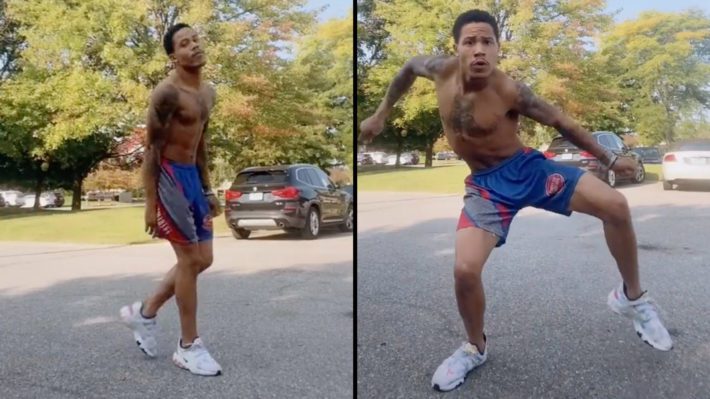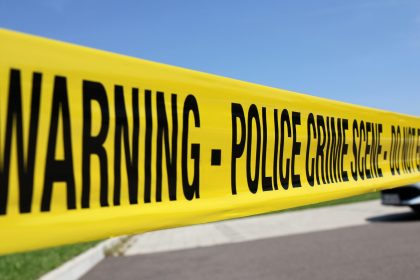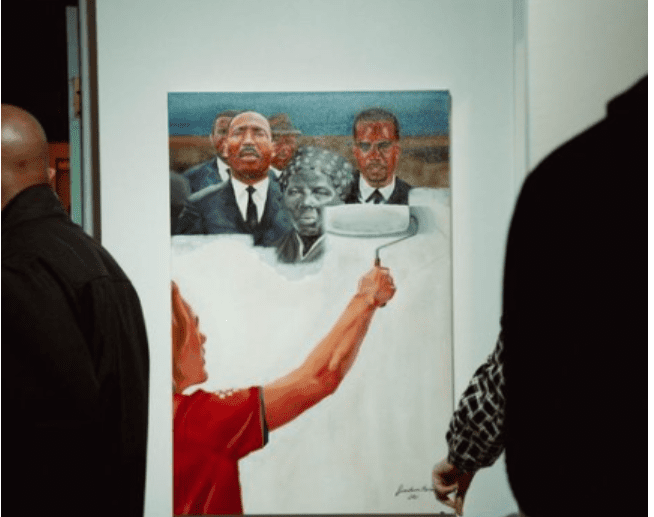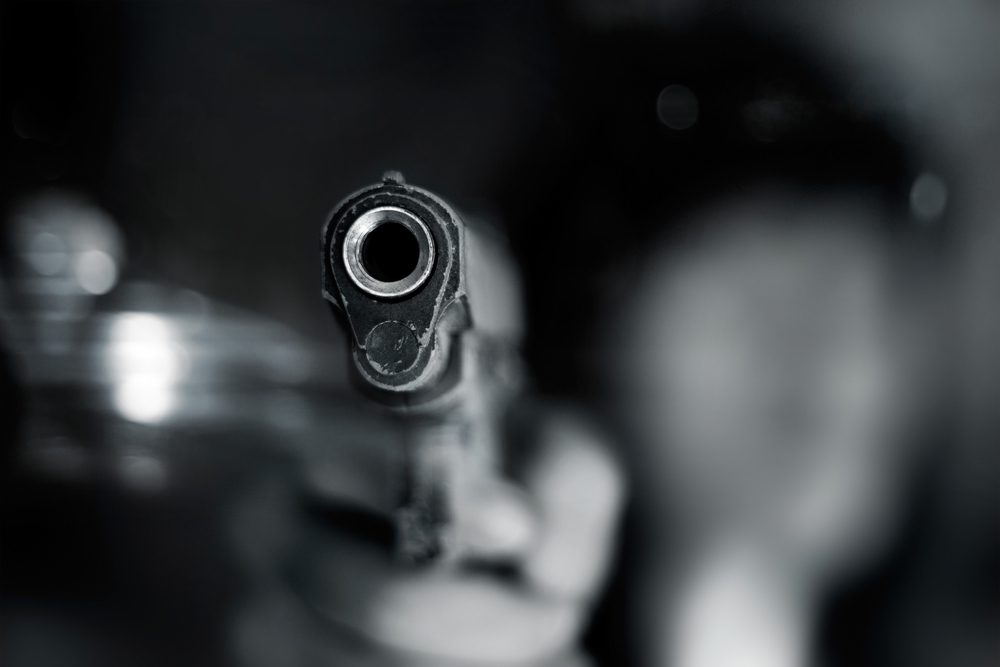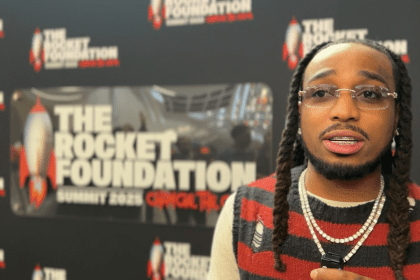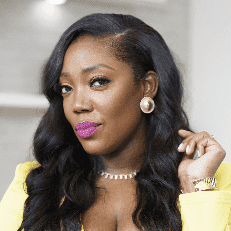
NY Times best-selling writer Shaka Senghor is very profound. Even Oprah, the queen of media, gave her stamp of approval. Senghor just appeared on Oprah’s “Super Soul Sunday” TV show where he bared his soul to the world, revealing how he turned his life around after serving 19 years in prison for second-degree murder and discussing the power of redemption and forgiveness.
Senghor also recently wrapped a book signing event in Detroit at the Charles H. Wright Museum of African American History, where he signed and sold over 500 copies of his memoir Writing My Wrongs: Life, Death and Redemption in an American Prison. The book signing was moderated by Shawn Wilson, manager, multicultural community engagement, Ford Motor Company Fund and Senghor shared excerpts from his book with a standing room only crowd. After the set, Senghor held a Q-and-A session with the audience and graciously took pictures with guests as he personally signed each book for everyone who stood in line. (Pictures below.)
Rolling out was able to obtain an exclusive interview with Senghor after his Detroit stop on his book signing tour. Senghor talked to us about life after being released from prison in 2010, his Oprah experience and how going forward he’s going to use his platform to help change lives and reduce recidivism. Check out the exclusive below and tell us what you think in the comments section. Also, be sure to catch Senghor on his book signing tour’s upcoming cities in NY at the National Black Theatre on March 22 and in L.A. on April 10 at the LA Times Festival of Books.
For those who may not already know your story, tell our readers about your story and who you are.
I am a writer, born and raised in Detroit. I started my writing career in solitary confinement at Oaks Correctional Facility during a 19-year stint in prison. I served a total of that 19 years in solitary confinement. That was the beginning of my writing career, but that wasn’t the beginning of my story. I grew up in Detroit on the eastside during the height of the crack era, crack epidemic. I got seduced into the crack trade, after I ran away from home. The first six months in, my childhood friend was murdered. My older brother was shot, then a year later, my oldest brother got shot. Then I was shot multiple times myself at the age of 17. Around 16 months later, I got into a similar conflict and ended up firing four fatal shots that tragically caused a man’s death. I was sentenced to 17-40 years in prison. When I went to prison I was bitter, I was angry and I didn’t want to take responsibility for my decisions. And I ended up getting in more trouble. I accumulated a total of 25 misconducts my first five years. Found myself in maximum security, multiple stints in solitary confinement, the longest being 4 1/2 years straight. But it was in solitary confinement that I actually found my authentic self. Through the process of journaling I had to ask the tough questions of how did I go from being an honor roll, scholarship student with dreams of being a doctor to serving out my most promising years in prison. I ended up discovering all of the different levels of abuse I had to experience growing up as a child and how that impacted my decision-making that led to me going to prison. I was released from prison on June 22, 2010, one day after my 38th birthday. So, at that point, I had spent half of my life in prison, and half of my life out. When I got out, I came out with a purpose and a mission to make sure that no other young man or woman ended up on the same path that I took.
Oprah introduced you to the world. Tell us about your Oprah experience.
It was an amazing experience. As a writer, to me, that’s the holy grail just to get your book in her hands because she’s one of the most respected sources when it comes to literature. I believe that any time you embark on a journey to do anything, you should aspire toward greatness. And the true measure of greatness as a writer is how you’re measured amongst other writers who are known as literary giants. And who better to articulate where you are as a writer than somebody who’s read everything you can imagine. It was a writer’s dream come true. But more importantly, it was a deep human soul connection. She’s one of the most authentic people that I’ve ever met. Her spiritual depth and the expansiveness of her wisdom are unparalleled in terms of anybody I’ve ever met or encountered. So, it was just a genuine connection. It was very real, very sincere. It wasn’t here’s some guy I’m interviewing, it was like “let’s connect as human beings and let’s talk.” And I think that’s what made the interview so impactful to a wider audience.
How was it meeting Oprah for the first time? Was she pretty easy to talk to?
I mean initially, I was like how do I greet her, but she just greeted me with the biggest hug and just a warm welcoming heart. And we had a real genuine conversation. Now, one of the things I think that she does that’s unique as a journalist is that she asked me what were my intentions with the interview. Nobody had ever asked me that before. You know, usually, it’s just kind of firing off a string of questions. But she really wanted to know what I wanted to get out of the interview, and she wasn’t focused on what she wanted to get out of it. And she allowed what I wanted to get out of it kind of lead the conversation. So, we originally were supposed to interview for 45 minutes, but we ended up talking for two and a half to three hours.
What do you think the next phase of your journey entails?
Really being able to add value to the community through literature. I think literature is one of the things that we’ve kind of got away from — in one way in terms of our collective consciousness. I want to bring back that love and that thirst for reading and for knowledge. Especially for young adults and for young teenagers to really understand how much power is in the written word. So, I’m excited about that part, I’m looking to eventually go on to publish more books and just live my life fully and vastly as a writer in various mediums. So, I’m looking to do film and television and all those great things. I have other writings that I haven’t published on a mainstream level. I want to explore writing new stuff, new content. I’ve written a lot of books, so I’m looking forward to writing new content and sharing that with people who are following my work.
Speaking of writing a lot of books, you are now a New York Times best-selling author. How does that feel?
It’s incredible. It’s a writer’s dream. To know that from a writers legacy standpoint, that I’ve accomplished one of the hardest feats to accomplish as a writer, which is to be recognized as a New York Times best-selling author, it’s an extreme amount of pride that no one will ever be able to take from me. To be able to do that my first week out, my first time out, it’s just an incredible experience and I’m extremely satisfied and happy about it.
So, you have this new platform now, how do you want to use it to spread your message?
My platform has been growing over the last few years. I think the starting point to my ascent towards a global platform started with TED. I did a TEDTalk in 2014, which was named one of the top talks and it’s influenced the conversation around the criminal justice reform in a major way. So, the space that I work in now, which is really about criminal justice reform and really reducing the prison population, this just adds to that platform in a very everyday way. Ted has a very unique audience and it reaches people who are very influential in the political space, in business and in philanthropy. But I think what’s happened with Writing My Wrongs, and getting this book into the hands into the everyday people, it’s just opening people’s eyes and minds in a way that nothing has before. I know Michelle Alexander, she wrote the brilliant book The New Jim Crow, which basically ushered in this conversation around mass incarceration. And I think that this is a great companion piece because this represents the very human element from an insiders point of view, as opposed to somebody on the outside looking in.
Anything else you want to tell our readers?
I think Writing My Wrongs is a book for the ages. Not just because I’m the writer, but because I really understand the moment that we’re in. I think that in order to solve a problem, you have to be in close proximity to it and Writing My Wrong’s will bring you as close to the prison experience as possible without you having to actually get arrested. The reviews have been phenomenal, from Bryan Stevenson to Michelle Alexander, to JJ Abrams, on up to Oprah. Across the board, people have been inspired deeply by the book. It’s the kind of book that’s going to move you to actions. I believe in redemption, I believe that where we are as a country we have to really think about what is our spiritual, religious foundation. Most people have some type of spiritual outlook on life, and the cornerstone of that is redemption, forgiveness and second chances. And I think that’s what this book represents to many people, not just myself.
Where can our readers find you?
Amazon.com. You can go to BeyondPrisons.org, which has everything about the movement we’re starting to reduce the prison population, Cut50.org. And you can find me on all social media at Shaka Senghor. Thank you for having me.
Photo gallery credit: Porsha Monique for Steed Media

















